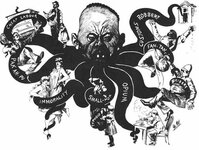
Posted on 10/20/2014 8:43:26 AM PDT by right-wing agnostic
In an interesting recent article, and a post at Prawfsblawg, legal scholar Mark Kende argues that Justice Clarence Thomas approves of Korematsu v. United States, the notorious 1944 Supreme Court decision that upheld the internment of over 100,000 Japanese-Americans during World War II.
Here is the article abstract:
The U.S. Supreme Court’s infamous decision in Korematsu v. United States, 323 U.S. 214 (1944) has been in the news recently as some scholars and advocates, such as Peter Irons, have asked the Court to formally repudiate the decision. This essay breaks new ground by demonstrating that Justice Clarence Thomas’s jurisprudence on executive power is consistent with that case. Two cases provide the major evidence. First, Justice Thomas was the lone dissenter in Hamdi v. Rumsfeld, 542 U.S. 507 (2004) where he reasoned that enemy combatants who were U.S. citizens have virtually no due process rights.
(Excerpt) Read more at washingtonpost.com ...
One of my mother’s best friends was interned during WWII. She was not a Japanese citizen and was, in fact, as patriotic as MacArthur or Patton.
Was she a child or an adult at the time?
She was about 18.
So it is very possible that she could have been interned without being a dual citizen as long as her parents were.
But Japan was planting colonies in the Americas. The US, Canada, Peru all places they put colonies with the idea of gaining a foothold and then taking over.
This was not a "pie in the sky" fear but something that had been ongoing for several decades before the war started. In Peru for example if you look at the leaders of the Japanese colonies there you will find they were all native born Japanese with their first loyalty to Japan.
In fact Peru deported many of their Peruvian born Japanese to the US for internment as did a number of South American countries.
You can say they were all suffering from hysteria.
Or you could say that when people come into your country and live in enclaves, send their children to be educated back in the "old country", do not bother to learn your language, take their orders from their former country and make no attempt to integrate that they might be regarded as a threat.

Immediately following Pearl Harbor, a Japanese enemy pilot landed on the Hawaiian Island of Niihau. How he was treated by the local Japanese sealed the internment decision for FDR: not that Internment was particularly difficult for the internees, decent housing and a college education awaited.
Disclaimer: Opinions posted on Free Republic are those of the individual posters and do not necessarily represent the opinion of Free Republic or its management. All materials posted herein are protected by copyright law and the exemption for fair use of copyrighted works.